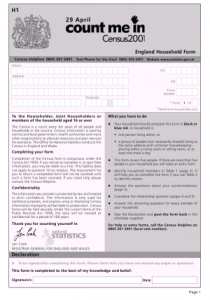The Ethnic Check
 Yesterday I received a letter from the State of California alerting me that my Census form is due next week and that I should be sure to fill it out and return it, as is decidedly my intention. That form will include the page that drives many Americans crazy — the one that offers you a bunch of ethnic backgrounds that you can identify yourself on. As my spouse of African-Cherokee-Jamaican-German and who knows what else decent says, this is not a multiple choice question for many of us. Personally, I always check the “white” box, which is not lying, although I always have a nagging doubt that the Semitic parts of my genetic makeup aren’t fairly represented by that choice.
Yesterday I received a letter from the State of California alerting me that my Census form is due next week and that I should be sure to fill it out and return it, as is decidedly my intention. That form will include the page that drives many Americans crazy — the one that offers you a bunch of ethnic backgrounds that you can identify yourself on. As my spouse of African-Cherokee-Jamaican-German and who knows what else decent says, this is not a multiple choice question for many of us. Personally, I always check the “white” box, which is not lying, although I always have a nagging doubt that the Semitic parts of my genetic makeup aren’t fairly represented by that choice.
Today, skimming through my news feed, I starred this article by Michelle Malkin, passed on by Google Reader’s “Cool” feed, and I just found time to read it. The gist of the article is that Census filler-outers should refrain from allowing the government to peg us by ethnicity, instead choosing “Other” and filling in the comment squares with “American”. Take that, Gubmint statisticians!
Now, this is interesting, because while Ms. Malkin proudly describes herself as a Fox News Commentator, I don’t think this question lands on a liberal/conservative scale. Discomfort with being pegged by race straddles all ideological outposts, as it should. But data is data, and the ethnic makeup of our country by geographic area is a powerful set of data. If we don’t know that a neighborhood is primarily Asian, White, Black or Hispanic, we don’t know if the schools are largely segregated. We don’t know if the auto insurance rates are being assessed with a racial bias. We don’t know if elected officials are representative of the districts they serve. And these are all very important things to know.
It might seem that, by eschewing all data about race, we can consider ourselves above racism. But we can board our windows and doors and dream that the world outside is made of candy, too. It won’t make the world any sweeter. If we don’t have any facts about the ethnic makeup and the conditions of people in this country, then we can’t discuss racial justice and equality in any meaningful fashion. We might hate to take something as personal as the genetic, geographic path that brought us to this country and made us the unique individuals that we are and dissect it, analyze it, generalize about it and draw broad conclusions. It is uncomfortable and, in a way, demeaning. But it’s not as uncomfortable and demeaning as being broadly discriminated against. And without evidence of abuse, and of progress, we can’t end discrimination. We can only board up the windows that display it.
So, I’m not going to take Ms. Malkin’s advice on this one, and I’m going to urge my multi-racial wife and kid to be as honest as they can with the choices provided to them. Because we want the government to make decisions based on facts and data, not idealizations, even if it means being a little blaze about who we really are.


Right on.